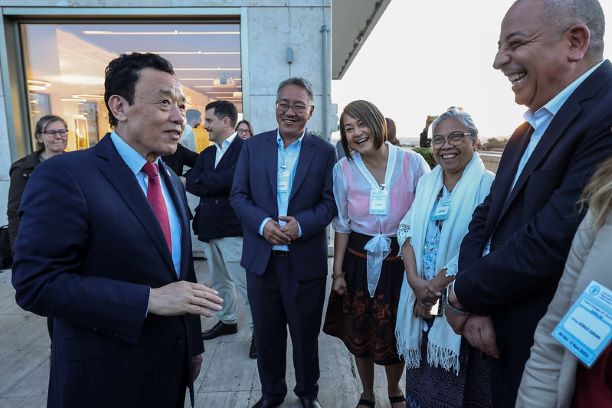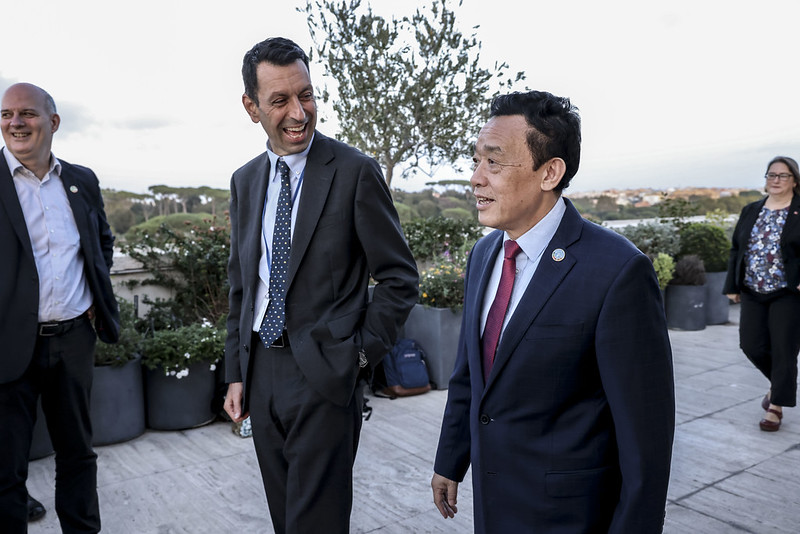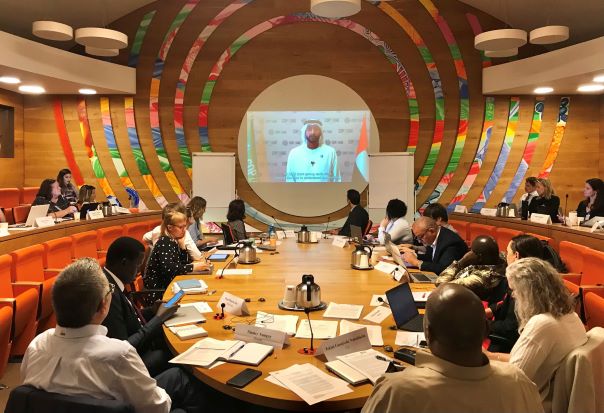Agriculture experts gather in Rome ahead of COP28 for First Informal Dialogue on Sharm el-Sheikh joint work

Dr QU Dongyu, FAO Director-General, met with agriculture experts in FAO headquarters on 31 October 2023
©FAO
Forty-five agriculture experts from 35 countries and the European Union gathered in Rome from the 31st of October to the 2nd of November to exchange ideas on next steps for the Sharm el-Sheikh joint work on implementation of climate action on agriculture and food security.
The Sharm el-Sheikh joint work is a four-year work programme under the United Nations Framework Convention on Climate Change (UNFCCC) , adopted at COP27 (through decision 3/CP.27), to address the fundamental priority of safeguarding food security and ending hunger, and the particular vulnerabilities of food production systems to the adverse impacts of climate change. The Sharm el-Sheikh joint work builds on outcomes of the Koronivia Joint Work on Agriculture (KJWA), which was established at COP23 in 2017 as a landmark process to advance discussions on agriculture in the UNFCCC.
“The Sharm el-Sheikh joint work represents a critical opportunity to enhance countries' capacities for the implementation of climate action in the agricultural sector, yet the challenge to reach a consensus and translate this into concrete actions on the ground, in line with the Paris Agreement, remains,” explained Julia Wolf, a FAO Natural Resources Officer leading the informal dialogue.
To support and facilitate this, FAO is hosting and organizing a series of informal expert dialogues which provide a neutral forum for open exchange among agriculture negotiators on ways to scale-up and accelerate implementation of the Joint Work. This first dialogue, co-organized with the COP28 Presidency and supported by CGIAR, World Bank and IFAD, comes at a critical moment as experts prepare for successful negotiations at COP28 in Dubai.


Dr QU Dongyu, FAO Director-General, and Kaveh Zahedi, Director, Office of Climate Change, Biodiversity and Environment (OCB) with agriculture experts in FAO headquarters.
As FAO Director-General, Dr QU Dongyu, said in his opening remarks at the recent FAO 137th Session of the Program Committee, “the dialogue was key to facilitate mutual understanding and trust-building among country agriculture negotiation experts from around the world, to lay the groundwork for the next decisive step to define a concrete work plan and clear deliverables that will be brought to COP28.”
Food and agriculture, key priorities at COP28
The Sharm el-Sheikh joint work is particularly pertinent this year as food and agriculture are key themes for the COP28 Presidency. December 10th has been designated Food, Agriculture and Water Day, with many thematic events taking place including a high-level ministerial meeting on the Food and Agriculture for Sustainable Transformation (FAST) multistakeholder partnership facilitated by FAO. Additionally, the COP28 Emirates Declaration on Sustainable Agriculture, Resilient Food Systems and Climate Action emphasizes agriculture and food systems transformation within the context of national climate efforts such as nationally determined contributions (NDCs) and national adaptation plans (NAPs). FAO is co-leading the task force that is providing the COP28 Presidency with a guidance toolkit on incorporating food systems into NAPs and NDCs building on longstanding support to countries to integrate agrifood system solutions into their climate plans, including through the SCALA programme.

Mr. Omar Al Baikri, UAE, Deputy Chief Negotiator, COP28 Presidency recorded a video message for the Informal Dialogue.
“Transforming food systems to respond to climate impacts and keep 1.5C within reach is a cornerstone of the COP28 agenda and its focus on sustainable growth, livelihoods and well-being. The COP28 Presidency has called on governments to ensure food systems and agriculture are central to climate action”, said Imelda (Dada) Bacudo, Senior advisor on Food Systems, COP 28 Presidency of the UAE.
“A positive decision on the Sharm El-Sheikh joint work at COP28 would send an important signal to the world on the critical role that agrifood systems can play in delivering the mitigation and adaptation people and the planet so urgently need,” she added.
Turning Sharm-el Sheikh into a functional cog in the wheel of climate action
Over the course of three days, agriculture experts discussed current gaps and barriers in the implementation of climate action in the agriculture sector, and provided regional updates that can inform the future of the joint work which must take context-specific realities into consideration. They also shared their views on possible future topics, collaborations, and timelines to get the work underway, with a view to reaching consensus on a clear way forward when they meet again at COP28 in December.
“This dialogue is a unique opportunity for a constructive exchange of ideas. We need to move forward with the implementation of the Koronivia outcomes, send a clear signal to scale up concrete actions on the ground, and outline common objectives for the next three years,” said Tomás M. Ainchil, a negotiator from Argentina.
“One key lesson learned from the Koronivia process is the need to move beyond talking. The Sharm el-Sheikh joint work builds on Koronivia emphasizing the implementation aspects,” said George Wamukoya, lead negotiator on agriculture, African Group of Negotiators Expert Support (AGNES).
The FAO Strategy on Climate Change 2022-2031 and Action Plan are closely aligned with the objectives of the Sharm el-Sheikh Joint Work. FAO is committed to supporting its development and implementation, building on previous achievements from the Koronivia process and providing countries with technical support, expert knowledge and capacity strengthening to adapt to and mitigate climate change.
It is interactions in these spaces that can lead to decisions and investments that will be critical for millions of smallholder farmers, pastoralists, Indigenous Peoples, youth and women who continue to face high risks and greater burdens from the impacts of climate change.
More about the Sharm El-Sheikh joint work:
https://www.fao.org/climate-change/action-areas/climate-negotiations/sharm-el-sheikh-joint-work/en
